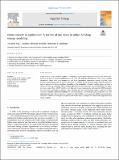From concept to application: A review of use cases in urban building energy modeling
Author(s)
Ang, Yu Qian; Berzolla, Zachary Michael; Reinhart, Christoph F
DownloadPublished version (6.517Mb)
Publisher with Creative Commons License
Publisher with Creative Commons License
Creative Commons Attribution
Terms of use
Metadata
Show full item recordAbstract
© 2020 The Authors Urban building energy modeling (UBEM) is a bottom-up, physics-based approach to simulate the thermal performance of new or existing neighborhoods and cities. The field has flourished in recent years, creating increasingly robust urban data streams that lead from Geographical Information Systems, CityGML, Light Detection and Ranging, and tax assessor databases to synthetic hourly building energy demand profiles for current and potential future conditions. Depending on the availability of historic building energy use data, a variety of modeling, simulation, and calibration approaches as well as use cases have been proposed. This paper provides a consolidated UBEM workflow with data and process requirements, and organizes UBEM proposals into four main application categories: urban planning and new neighborhood design, stock-level carbon reduction strategies, individual building-level recommendations, and buildings-to-grid integration. For each application, the paper further introduces a minimum viable UBEM, a novel concept for UBEMs conceptualized in the spirit of a minimum viable product. Specific case studies and/or examples are listed for each application area where available.
Date issued
2020Department
Massachusetts Institute of Technology. Sustainable Design LabJournal
Applied Energy
Publisher
Elsevier BV